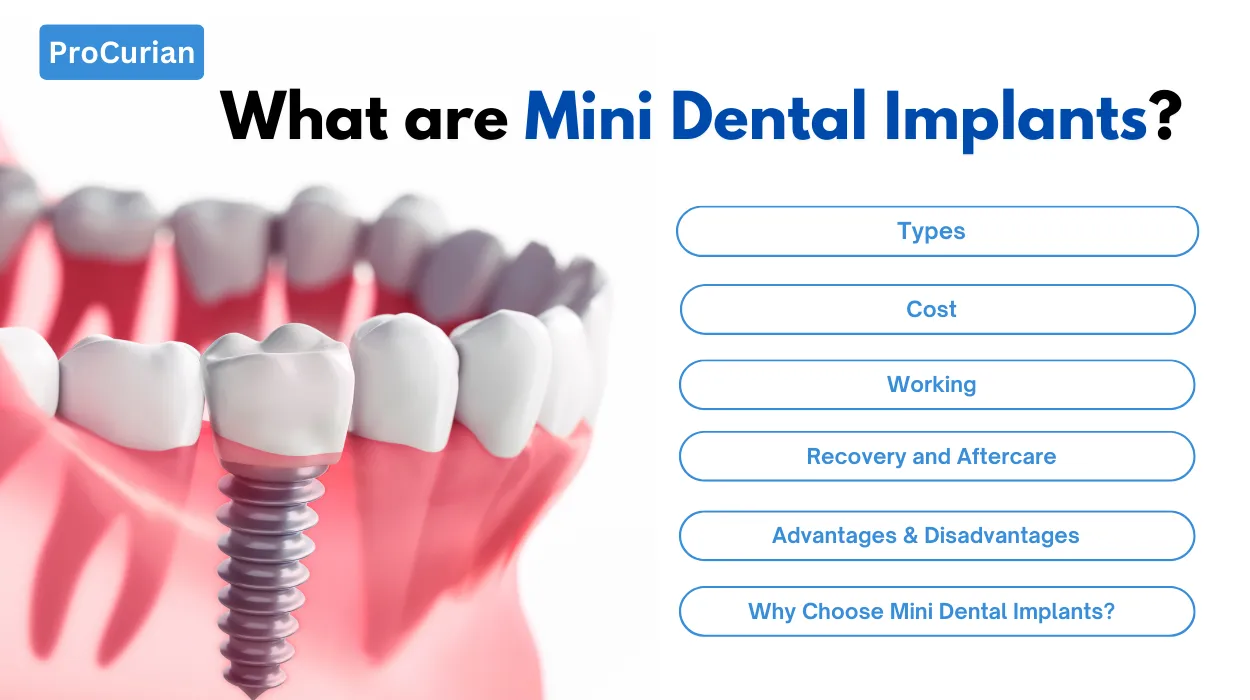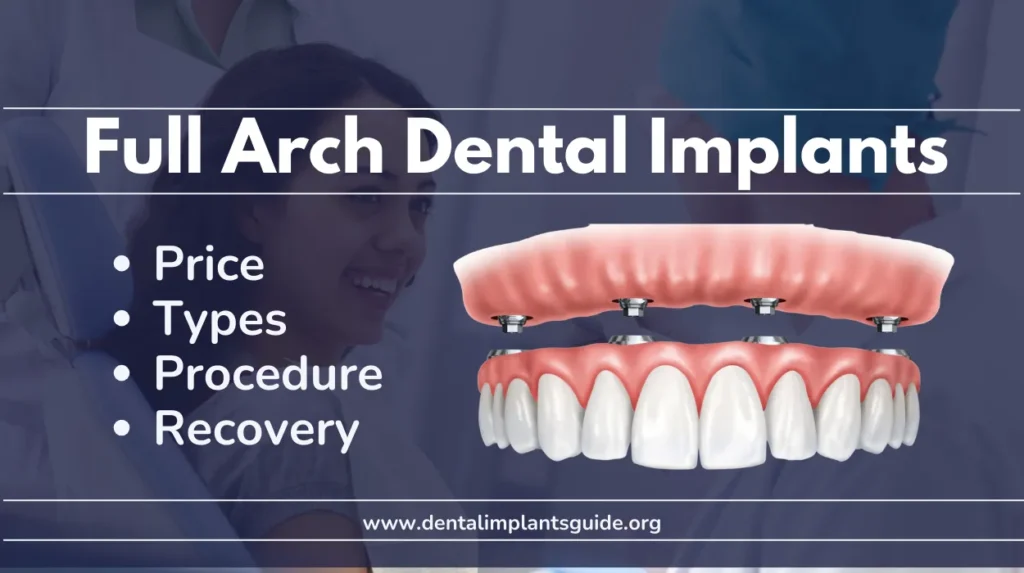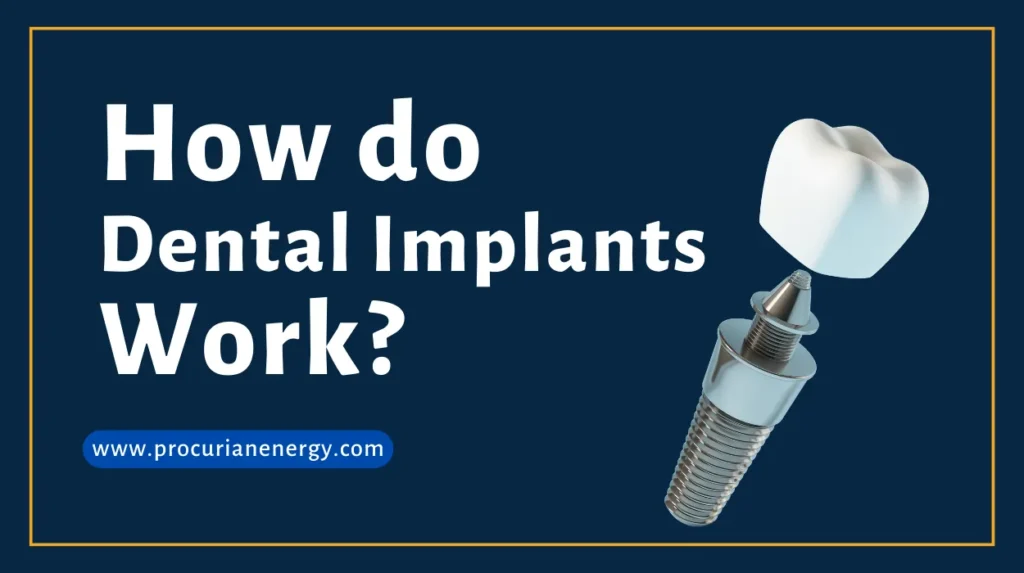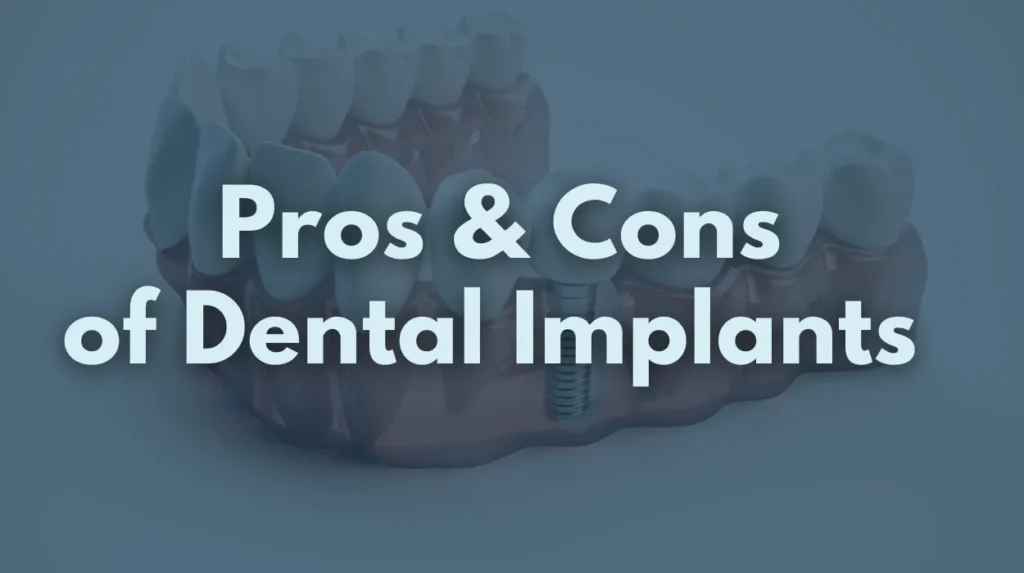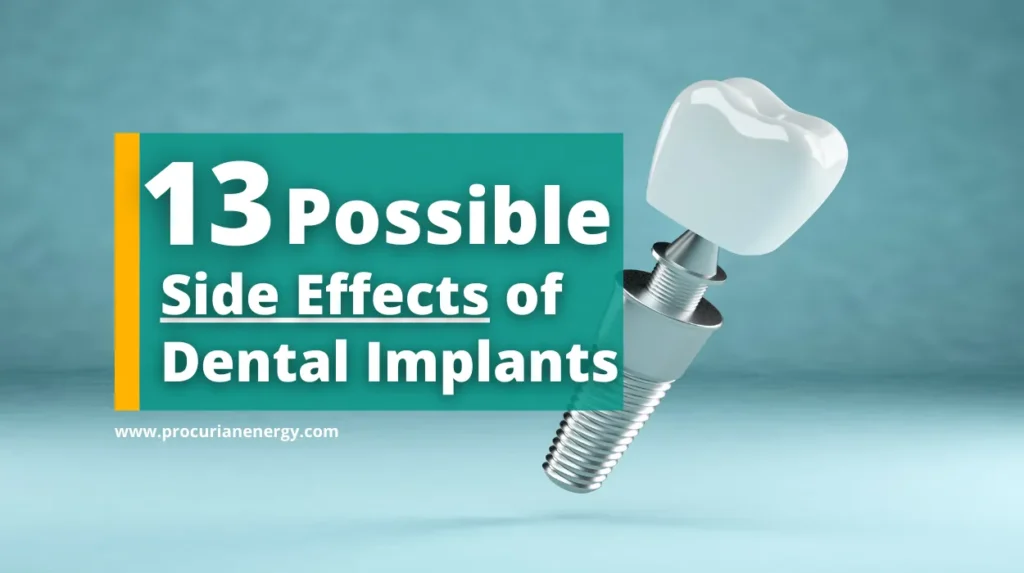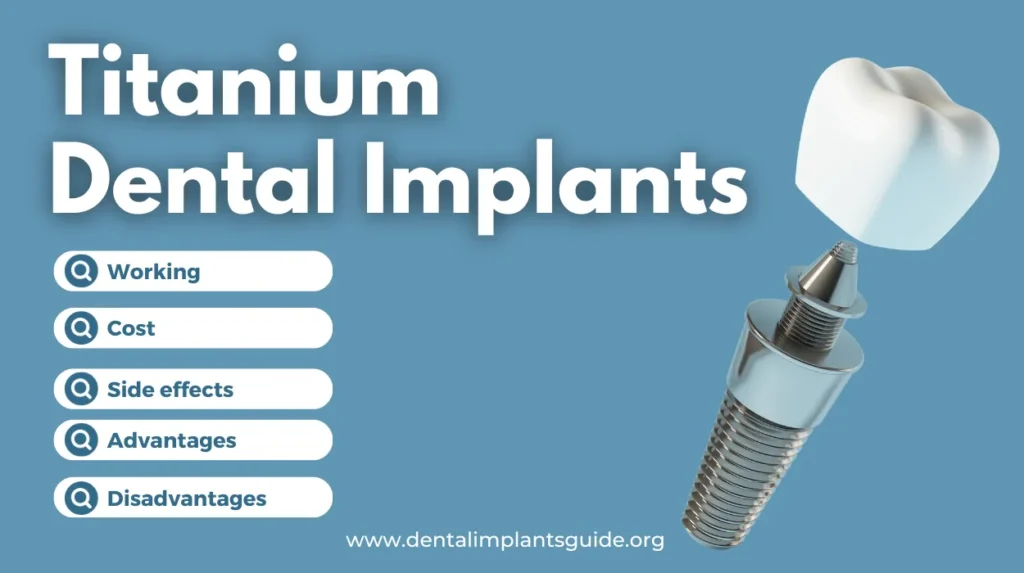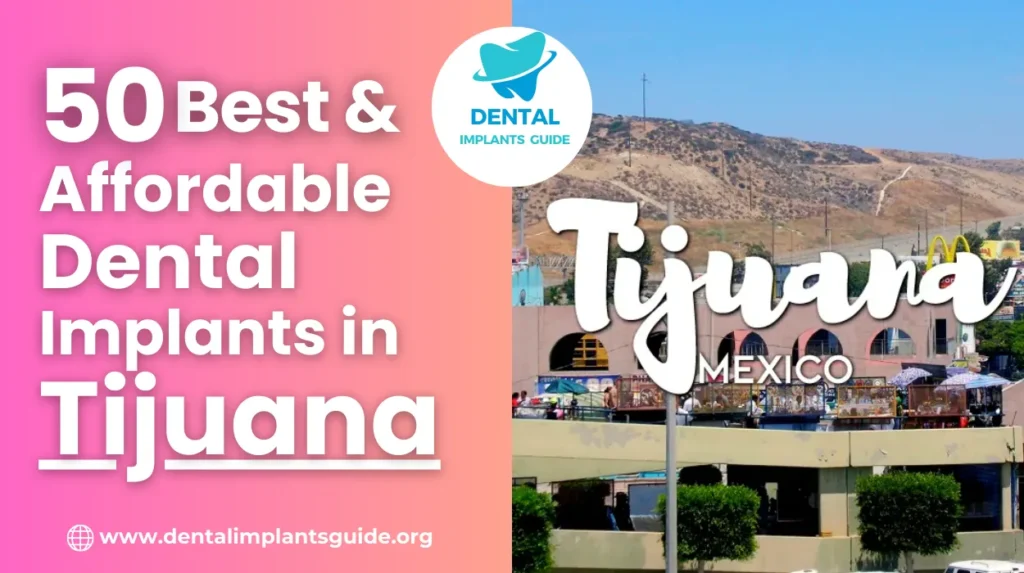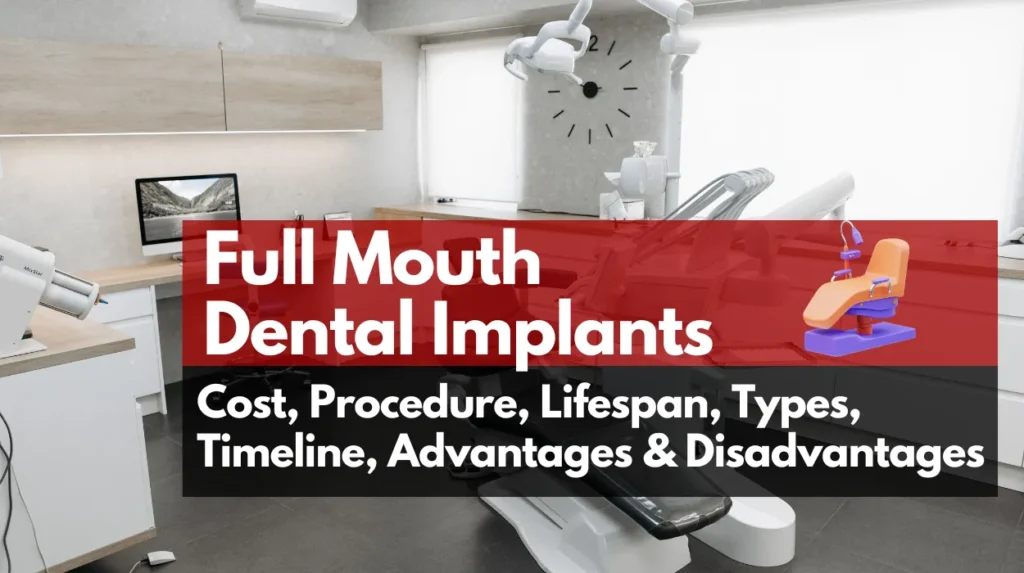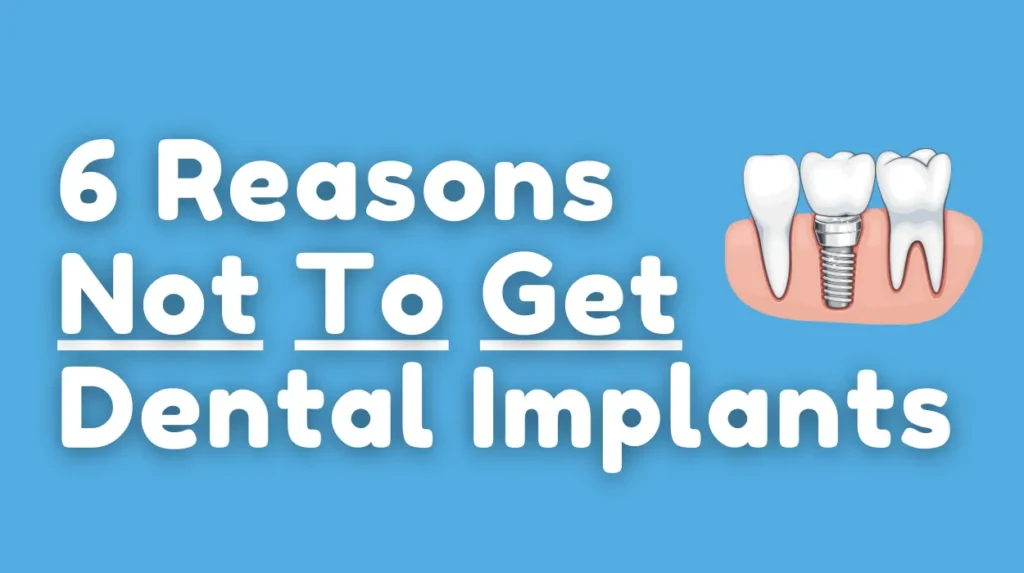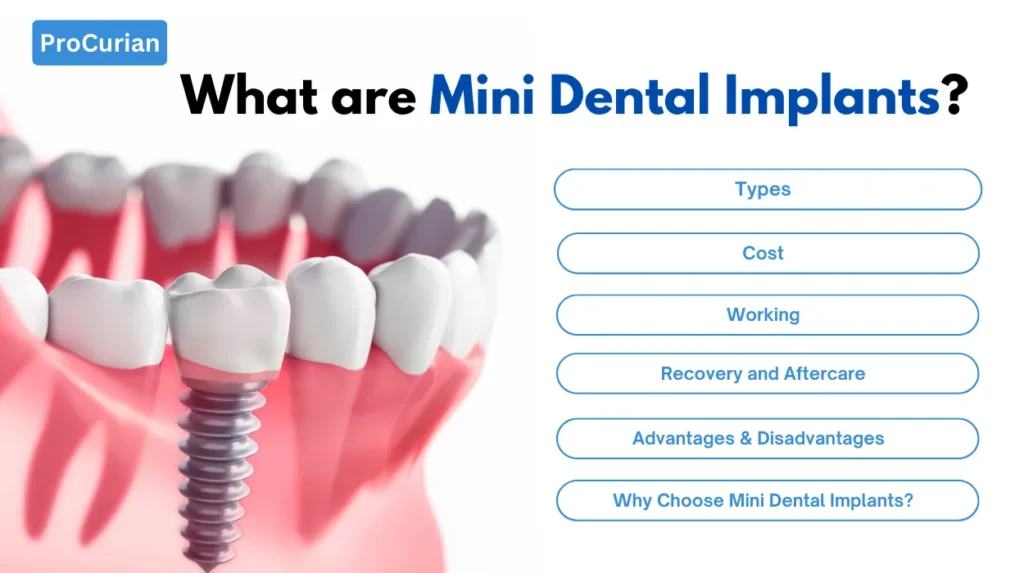
Do you have missing teeth or loose dentures? Mini dental implants may be the answer to your dental issues.
We’ll explain everything you need to know about mini dental implants in this simple guide, from what they are to their types, costs, working, advantages & disadvantages, and reviews. Let’s start now!
What Are Mini Dental Implants?
Mini dental implants, also known as MDIs or small diameter implants, are a type of dental implant that can be used to stabilize loose dentures or replace missing teeth. Mini dental implants are usually less than 3 millimeters in diameter.
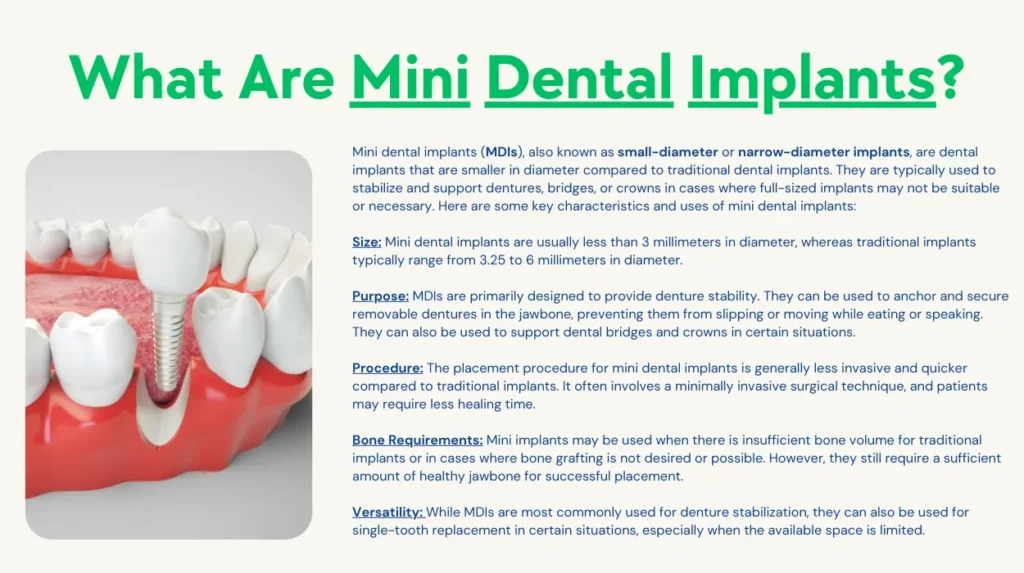
Compared to conventional dental implants, they are smaller and are made differently. Mini dental implants connect your replacement tooth or denture to a titanium post with a ball-shaped attachment on top.
Are Mini Dental Implants Right for You?
Mini dental implants are a fantastic option for many, but they may not be suitable for everyone. Here are some factors to consider:
- Your overall health.
- The condition of your gums and jawbone.
- Your specific dental needs and goals.
Why Choose Mini Dental Implants?
Now that you know what mini dental implants are, you might be wondering why someone would choose them over traditional implants. Here are some compelling reasons:
1) Less Invasive – Mini dental implant placement is a minimally invasive procedure, meaning it’s less painful and requires a shorter recovery period.
2) Faster Procedure – The entire process, from implant placement to crown attachment, is often quicker with mini dental implants.
3) Denture Stability – Mini dental implants are a game-changer for denture wearers. They provide a stable foundation, preventing embarrassing slips and discomfort.
4) Preserve Bone – They require less bone density, making them a viable option for people with bone loss issues.
Let’s take a look at some key differences between mini dental implants and traditional dental implants:
| Mini Dental Implants | Traditional Dental Implants | |
|---|---|---|
| Size | Smaller | Larger |
| Procedure Duration | Quicker | Longer |
| Recovery Time | Faster | Slower |
| Suitability for Denture Users | Excellent | Good |
| Bone Requirement | Less bone needed | More bone needed |
Types of Mini Dental Implants
Mini dental implants come in different types to suit different dental needs:
- Single Mini Dental Implants:
- Used for replacing one missing tooth.
- It’s like having a new tooth with a tiny implant and a crown.
- Mini Implants for Denture Support:
- Keeps dentures in place.
- Multiple mini implants hold your dentures securely, so they don’t wiggle around.
- Mini Implants for Partial Dentures:
- When you’re missing some teeth but not all, mini implants help hold your partial dentures steady.
- Temporary Mini Dental Implants:
- Used for a short time.
- Often while planning for permanent implants or during braces.
- Conical Mini Dental Implants:
- Strong and stable shape.
- Great for dentures and single missing teeth.
- Spherical Mini Dental Implants:
- Rounded shape for even force.
- Used when you need more support for dentures or other dental things.
- One-Piece vs. Two-Piece Mini Implants:
- One-piece: Simple, all-in-one implants, often for dentures.
- Two-piece: With a separate connector, more versatile for different fixes.
- Traditional vs. Mini Dental Implants:
- Mini implants are smaller.
- Traditional implants are bigger and used for tougher cases with denser bone.
Cost of Mini Dental implants
On average, it’s between $500 to $2,000 for each implant. If you need 4-6 mini implants to secure lower dentures, it might cost you between $2,500 and $6,000.
Remember, prices can change depending on where you live and your specific needs.
Note: If you’re unable to afford dental implant surgery, consider exploring options like dental implant grants. These programs may provide financial assistance or discounts to help cover the cost of the procedure. Even if you didn’t get approved for the grants, here are some insurance that covers Dental implants.
Advantages & Disadvantages of Mini Dental Implants
| Advantages | Disdvantages |
|---|---|
| 1. Minimally Invasive: – Less pain and discomfort during placement. – Shorter recovery time compared to traditional implants. | 1. Not Suitable for All Cases: – May not be suitable for patients with severe bone loss or certain medical conditions. |
| 2. Quick Procedure: – Faster implant placement and crown attachment. – Often completed in one dental visit. | 2. Smaller Size: – Their small size may not provide the same stability as larger traditional implants. |
| 3. Denture Stability: – Ideal for stabilizing loose dentures. – Prevents dentures from slipping or moving. | 3. Limited Restoration Options: – May not be suitable for complex cases requiring extensive restoration work. |
| 4. Preserves Bone: – Requires less bone density than traditional implants. – Suitable for individuals with bone loss issues. | 4. Cost: – While generally more affordable than traditional implants, costs can still add up, especially for multiple implants. |
| 5. Quick Healing Time: – Patients often experience a faster recovery period. – Can return to regular eating and speaking sooner. | 5. Limited Long-Term Studies: – Mini dental implants are a relatively newer technology, so long-term performance data is limited. |
| 6. Improved Chewing Ability: – Restores the ability to eat a wide range of foods. – Enhances overall quality of life. | 6. Not as Strong as Natural Teeth: – Mini dental implants may not be as strong as natural teeth and could be more prone to damage. |
| 7. Enhanced Confidence: – Provides a stable and confident smile. – Boosts self-esteem and social interactions. | 7. Maintenance Required: – Like natural teeth, they require proper oral care and maintenance to ensure longevity. |
Recovery and Aftercare of Mini Dental Implants
Recovering from mini dental implant surgery is typically faster and less painful compared to traditional implants. Here are some tips for a smooth recovery:
- Follow your dentist’s post-operative instructions carefully.
- Stick to soft foods & avoid dairy products for a few days.
- Avoid putting too much pressure on the implants during the healing phase.
- Maintain good oral hygiene with gentle brushing and mouthwash.
Are mini dental implants worth it?
Yes, mini dental implants can be worth it for many people. They can help you eat, smile, and speak better if you have missing teeth or loose dentures.
Are mini implants painful?
No, mini implants are usually not very painful. During the procedure, you’ll be given medicine to numb the area, so you won’t feel much pain.
Afterward, you might feel some discomfort, but it’s usually not too bad, like a little soreness.
What is the safest dental implants?
The safest dental implants are the ones that are made of materials like titanium or zirconia. These materials are well-tolerated by the body and have a long track record of safety.
What is the failure rate of mini dental implants?
The failure rate of mini dental implants is usually low, around 5% or less. Most of the time, they work well and last a long time.
The success of mini implants depends on factors like your overall health, oral hygiene, and the skill of the dentist.
How long do mini dental implants last?
Mini dental implants can last for many years, often 10 to 15 years or more. Good oral hygiene and regular check-ups with your dentist can help them last as long as possible.
Are mini implants FDA approved?
Yes, mini dental implants are FDA approved. That means they have been checked and are considered safe for certain dental treatments by the U.S. Food and Drug Administration. So, you can have confidence in their safety when used by a qualified dentist.
Can mini implants be used for front teeth?
Yes, mini implants can be used for front teeth. They work well for both front and back teeth, depending on the individual’s dental needs.
Important FAQs
What are mini dental implants?
How do mini dental implants differ from regular ones?
Are mini dental implants permanent?
Do mini dental implants hurt during the procedure?
Can I eat normally with mini dental implants?
How long does the whole process take?
Are mini dental implants suitable for everyone?
What’s the cost of mini dental implants?
Final Words
Mini dental implants are a simpler, more affordable, and effective way to restore missing teeth or secure sagging dentures. You can benefit from the advantages of these little wonders for many years to come with the right upkeep and care.
Say goodbye to your missing teeth and hello to a happier, more assured smile!
